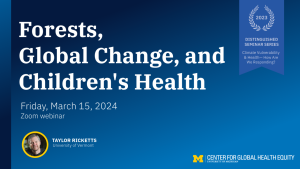Presented By: Center for Global Health Equity
Forests, Global Change, and Children's Health
Taylor Ricketts, University of Vermont

The health benefits of nature are attracting increasing popular and scientific attention, but specific impacts of global change on human well-being remain poorly quantified and difficult to predict. In this talk, Dr. Ricketts will describe ongoing efforts to estimate health impacts of land-use change in developing countries, using a unique dataset including 800,000 children in more than 40 countries.
To date, his research has revealed that nearby forest cover and protected areas improve several dimensions of children’s health, including water-borne disease, stunting, diet diversity, and malaria. In all cases, the impact of nature on health outcomes is stronger for more vulnerable populations. These and other studies can help to identify when and where nature conservation can constitute an investment in public health and social justice.
This event is co-sponsored by the School for Environment and Sustainability, the International Institute, the Office of Global Public Health, and the Institute for Global Change Biology.
To date, his research has revealed that nearby forest cover and protected areas improve several dimensions of children’s health, including water-borne disease, stunting, diet diversity, and malaria. In all cases, the impact of nature on health outcomes is stronger for more vulnerable populations. These and other studies can help to identify when and where nature conservation can constitute an investment in public health and social justice.
This event is co-sponsored by the School for Environment and Sustainability, the International Institute, the Office of Global Public Health, and the Institute for Global Change Biology.